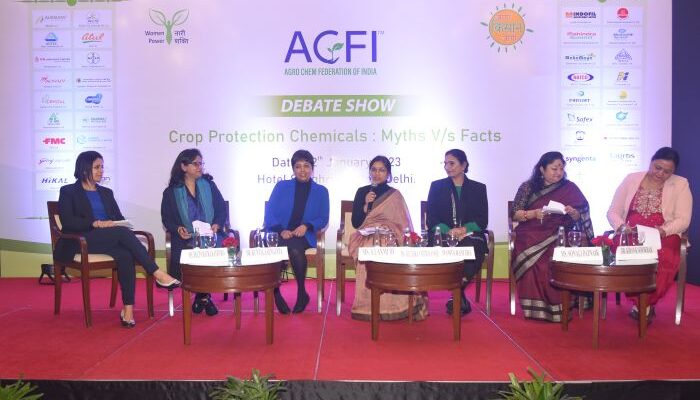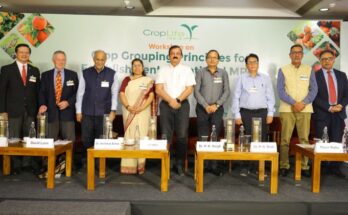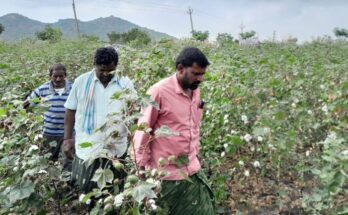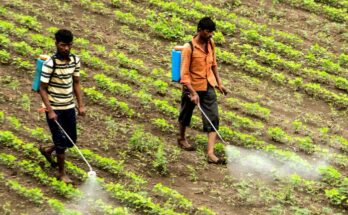In India, a lot of misinformation or myths are being propagated on crop protection chemicals and a narrative based on misinformation is being pushed to harm India’s food security and farmers’ interests, was the conclusion of a seminar organised by the industry body of crop protection chemicals producers – Agro Chem Federation of India (ACFI) in New Delhi on Thursday.
An all-female panel comprising of scientists, lawyers, experts on regulatory framework, civil society members, journalists and columnists, along with industry body members debated various myths related to crop protection chemicals and agreed on educating the stakeholders, especially the farmers and urban intelligentsia and invest in research and development to improve the crop yield to ensure food security in India.
Quoting Swami Vivekananda, Dr. Kalyan Goswami, Director General of ACFI, said that the truth remains the truth even if you speak in different ways. Hence, a lie remains a lie even if spoken in different forms and forums. “As an industry, we are here to protect the plant and millions of lives from hunger and associated risks,” emphasised Dr. Goswami.
You may also like to read: Best Agrolife gets CIBRC nod to manufacture Propaquizafop Technical herbicide
In order to bust a number of myths against the use of crop protection chemicals through the use of facts in her presentation, Deepa Batra Kathuria, Regulatory Head, FMC India said, “The industry is being blamed for myths like usage of pesticides in large quantities, reducing crop yield and rising number of cancer cases, whereas the facts are otherwise. For example, India’s grain production is increasing every year, in terms of cancer cases even a non-agriculture country like Singapore has more percentage of cases than India. Similarly, India uses just a one-third quantity of crop protection chemicals per hectare in comparison to China. ”
Presenting a view of the industry, Mamta Rani Jha, Senior Partner, Head – Litigation & Opposition, Inttl Advocare was of the view that as a country we cannot survive without crop protection chemicals because the pests can reduce the crop yield from about 30 per cent to more than 70% per cent. “In such a situation, our food security and goal of a hunger-free society will be in jeopardy.”
Representing the civil society in the panel and drawing upon her field experience, Sonali Patnaik, Director, Arupa Mission Research Foundation, highlighted the issues of excessive use of chemicals by farmers or labourers on the want of knowledge and lack of safety kits when labourers sprinkle the chemicals or pesticides. “Crop protection chemical industry should increase efforts to ensure the safety of farmers and labourers on the one hand and ending hunger and malnutrition on the other hand, “exhorted Patnaik.
You may also like to read: BioPrime AgriSolutions receives patent for novel bio-formulation to manage abiotic stress in plants
Voicing the concerns of common citizens, Kuntala Sengupta, a Columnist said, “While hearing other panellists, a lot of myths I was carrying have been busted, however, I would suggest the industry to create awareness about this on a large scale, so that common citizens of India could benefit and do not fall prey to misinformation or myths on crop protection chemicals.”
Speaking on organic agriculture, Dr. Kiran K. Khokhar, In-charge of the Regional Soil Testing lab at Karnal, Haryana said that rice and wheat need around 60 kg of urea, a nitrogen fertiliser, per acre, and with the number of cattle reducing in villages, it is not possible to meet the need by using only farm yard manure which contains only 0.5 per cent of nitrogen. “While organic farming as an option of sustainable farming can continue, however, it is impossible to generate the crop yield required for our population. Thus, crop protection chemicals are essential to meet our food needs.”
Laxmidevi A, a senior journalist with Press Trust of India, advocated the middle ground and appealed to the industry to be united in order to weed out the counterfeit agrochemicals being pushed by non-industry body members. Ruchika Chitravanshi, Assistant Editor, Business Standard moderated the session.





Thanks for sharing such an interesting blog. It’s a very helpful article. Thank you Once again!